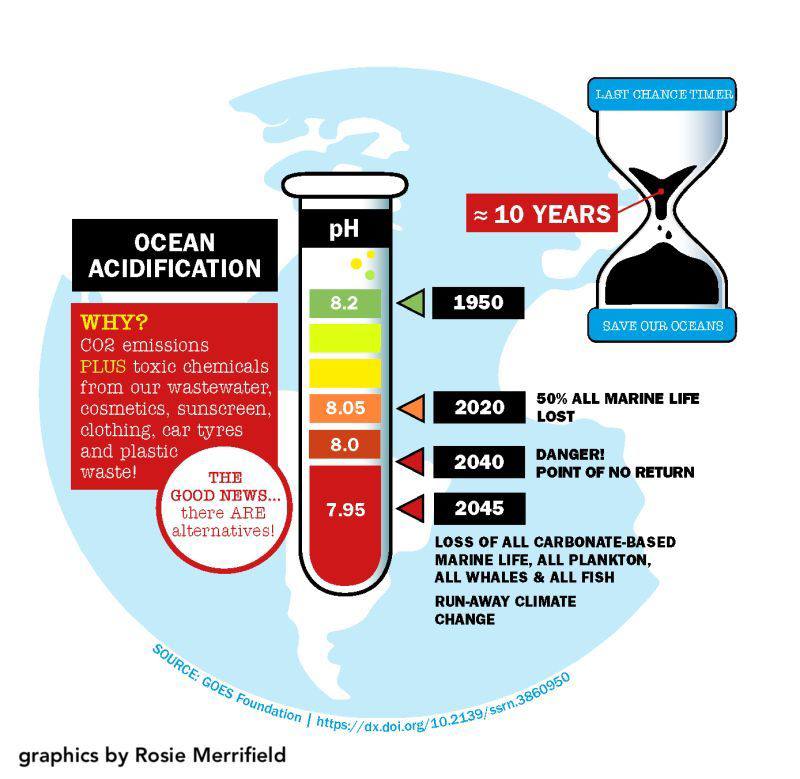Are you ready for some good news? The European Union (EU) has just passed a law that will finally put the world on the right road towards solving the climate crisis. It’s a great start, and in the United States, Congress is almost there, too – just one step behind.
Yes, the overheating of the planet is the biggest problem humanity has ever faced. The world has failed to reduce greenhouse gas emissions, which has brought our entire ecosystem to the brink of ruin. But it is too early to throw in the towel. This dire situation actually holds the key to transformative change – a key we can find by understanding how our ocean ecosystems are on the verge of utter demise from the collapse of vital plankton pastures due to the loss of the mineral dust that sustains them, and from a parallel driver of doom: ocean acidification.
Ocean restoration, with key in hand, charts a course back from the abyss.
The trillion-plus tons of CO2 humans have put into the atmosphere has been combining with the H20 in the ocean, forming a juggernaut of excess H2CO3, or carbonic acid. Ocean acidification is now so devastating that this drop in pH (the scientific scale used to measure acidification) can, according to Scottish ocean scientist Howard Dryden, lead to a nightmare scenario where “most life in the oceans will simply dissolve over the next 25 years.” Other scientists give it more time, but the point is: This needs to be dealt with immediately.

Fortunately, scientists have developed and proven a feasible way to heal the ocean by restoring vital ocean plankton using what’s called Ocean Pasture Restoration (OPR). In concert with other holistic nature-based efforts, OPR replenishes iron-depleted waters with trace amounts of iron nanonutrients. Restored plankton brings the pH level back to a survivable level. When it interacts with carbonic acid, plankton transforms it into three beneficial parts: H2O (water), O2 (oxygen for us to breathe), and C (carbon). The plankton then takes that new carbon and creates more plankton via photosynthesis. This restorative process will lead to a thriving ocean ecosystem.
To understand why plankton populations are currently so low – and to fathom the swift, safe, nature-based, eco-friendly route to their rejuvenation – delve into my earlier piece, 100 Villages: How Bringing Back the Fish Will Repair the Climate.
Back to the good news. In recognizing that such eco and ocean restoration are an immediate necessity, the EU Parliament passed the Nature Restoration Law on July 12. The law provides €8.3 billion per year to deploy eco-restoration action for 20% of the seas and land by 2030 and almost all degraded ecosystems by 2050.
And, lo and behold, Congress is also calling for the restoration of ocean ecosystems. A bill called the Ocean Restoration Research and Development Act set to be introduced in the House provides $33 million per year for five years of annual matching industrial stimulus grants for R&D projects – including the immediate deployment of OPR to regenerate plankton. Restoring plankton to its historic levels of health and productivity sets the stage for reversing ocean acidification. Additionally, plankton restored to their historic levels have the potential to sequester up to 30 gigatons of CO2 annually – a monumental stride towards mitigating or even solving the climate crisis.
Decades of academic, institutional, and private-sector science have developed, deployed, and proven the efficacy of OPR as a breakthrough, planet-saving technology. The new EU and US laws represent a significant global policy shift pushing this work into the private sector after 50 years of almost entirely academic research. Hopefully, this shift comes in time to replenish and restore our Blue Planet’s oceans.
Plankton restoration will deliver a trifecta of bonus benefits. First, plankton blooms generate huge amounts of white clouds, which reflect light and heat back into space, cooling the planet. Second, trillions upon trillions of zooplankton – numbers akin to the quantity of stars in the universe – with their minuscule fins will stir up cold oceanic waters from the depths to cool scorching surface temperatures. Today, surface water is already hot enough to supercharge tropical storms into hurricanes, and this summer ocean water temperatures made it unsafe for children and pregnant people to swim at Miami Beach. And third, restored plankton will supply the missing ingredient in the food chain that will bring back fish, whales, seabirds, and all of oceanic life.
The Ocean Restoration R&D Act transcends politics. It follows in the footsteps of 20th-century president and renowned naturalist Teddy Roosevelt. Sponsored by a stalwart Republican conservationist, Rep. Buddy Carter of Georgia, it is a clarion call for unity, bridging partisan divides to deliver a vital step forward in addressing climate ruin. But just as the EU has taken the lead with incredible pioneering strides, the US must seize the mantle and escalate its proposed funding for ocean restoration.
Despite efforts by arch-conservatives (like The Heritage Foundation) to broadly dismantle environmental protections, there is a growing recognition across the board of the importance of ecosystem restoration. Of course we also need to reduce emissions, but the once-relevant formula of Emissions Reduction = Climate Solution, valid when greenhouse gas levels were lower, fails in the face of trillions of tons of already amassed CO2 sitting in the atmosphere cooking us as we speak. If a magic wand put a stop to all new emissions today, we would still continue to cook and the oceans would still be dying from yesterday’s CO2. This is a menace that, on its own, would only disappear after centuries.
We must remove the lethal greenhouse gasses that currently exist in the atmosphere and are actively both roasting us and acidifying the oceans. We can accomplish that by nurturing our oceanic ecosystems. Revitalized plankton will produce the largest and most immediate CO2 sequestration of any proposal out there, while also annihilating carbonic acid and feeding all oceanic life. It is Eco-Judo at its best, repurposing poisonous CO2 to foster new beneficial life.
This is the moment scientists, politicians, climate activists, and all of us have yearned for. As humanity awakens to a fresh paradigm, let us embark on this voyage of recovery, breathing life into our precious Blue Planet once more.
Visionaries in the legislatures of both the EU and the US are stepping up, not merely to acknowledge these truths but to shout: “All hands on deck!” They are taking real action. Finally, the tides are shifting from the insufficient reliance on emissions reduction alone to encompass ecosystem restoration to avoid climate ruin and solve the current cataclysm in our oceans. Ocean restoration holds the key and will lead the charge.



Great article! It’s about time we start facing the reality that lowering emissions (not that we’ve lowered them at all) will not save the planet in the short run and the people who will suffer the most and the soonest are of course black and brown. We have got to focus on removing CO2 from the atmosphere and mitigating its effects right now or soon we will all be given front row seats to Barnum and Bailey’s Greatest Hell on Earth. Ocean restoration seemingly is one of the most promising and economical potential solutions we have today. Let’s get going!
Hi Alex, this is such superb news that the penny is finally dropping on the need to restore ocean pastures. There is an even more urgent concern, that climate tipping points such as ice melt will undo all this good work by sending weather systems into chaos. That can be prevented through the emergency response of increasing planetary albedo, reflecting more sunlight back to space to brighten the planet. Plankton contributes mightily to that, as you mention, but more is needed, such as using sea salt to brighten clouds. All these benign measures are urgently required to maintain the fragile stability of our climate system. Our planet is far more sensitive to these shocks than most people see, but scientific responses such as ocean pasture restoration and marine cloud brightening can bring us back from the brink.
Excellent overview Alex!
Alex Carlin is a quiet genius. Really, I think it was 160 IQ. And unlike most men he has a high EQ. I’ve known him a long, long time. And I am proud to know him.